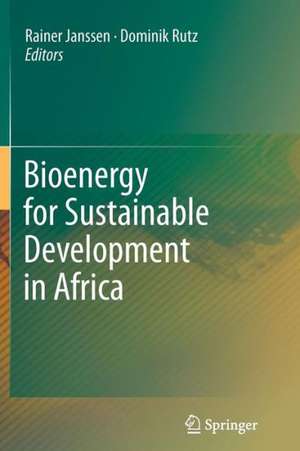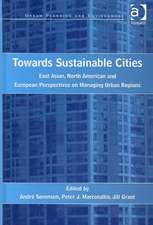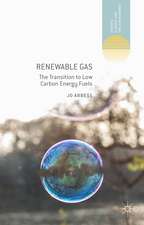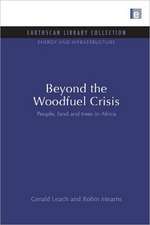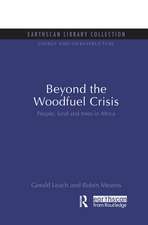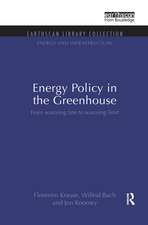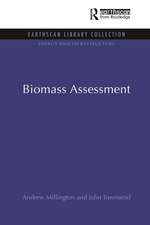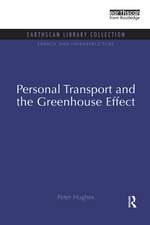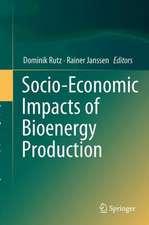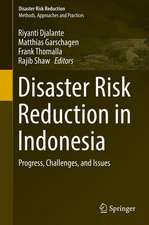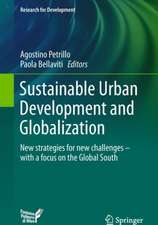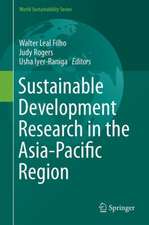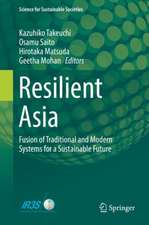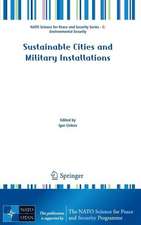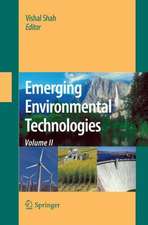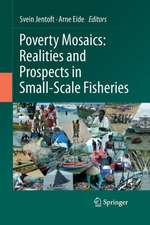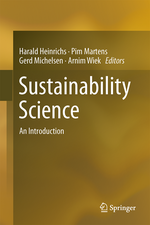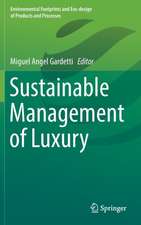Bioenergy for Sustainable Development in Africa
Editat de Rainer Janssen, Dominik Rutzen Limba Engleză Paperback – 26 ian 2014
| Toate formatele și edițiile | Preț | Express |
|---|---|---|
| Paperback (1) | 951.47 lei 43-57 zile | |
| SPRINGER NETHERLANDS – 26 ian 2014 | 951.47 lei 43-57 zile | |
| Hardback (1) | 956.03 lei 43-57 zile | |
| SPRINGER NETHERLANDS – 3 noi 2011 | 956.03 lei 43-57 zile |
Preț: 951.47 lei
Preț vechi: 1160.32 lei
-18% Nou
Puncte Express: 1427
Preț estimativ în valută:
182.07€ • 190.57$ • 151.53£
182.07€ • 190.57$ • 151.53£
Carte tipărită la comandă
Livrare economică 31 martie-14 aprilie
Preluare comenzi: 021 569.72.76
Specificații
ISBN-13: 9789400793699
ISBN-10: 9400793693
Pagini: 444
Ilustrații: XXX, 414 p.
Dimensiuni: 155 x 235 x 23 mm
Greutate: 0.62 kg
Ediția:2012
Editura: SPRINGER NETHERLANDS
Colecția Springer
Locul publicării:Dordrecht, Netherlands
ISBN-10: 9400793693
Pagini: 444
Ilustrații: XXX, 414 p.
Dimensiuni: 155 x 235 x 23 mm
Greutate: 0.62 kg
Ediția:2012
Editura: SPRINGER NETHERLANDS
Colecția Springer
Locul publicării:Dordrecht, Netherlands
Public țintă
Professional/practitionerCuprins
Part I: Biomass Production and Use.- 1. Keynote Introduction: Traditional and Improved Use of Biomass for Energy in Africa.- 2. Biomass Potential in Arid and Semi-arid Regions in Botswana.- 3. Jatropha - A Promising Crop for Africa’s Biofuel Production?- 4. Small-scale Production of Jatropha in Zambia and Its implications for Rural Development and National Biofuel Policies.- 5. Economic Evaluation of Sweet Sorghum in Biofuel Production as a Multi-purpose Crop: The Case of Zambia.- Part II: Biomass Technologies and Markets.- 6. Keynote Introduction: Biomass Technologies and Markets in Africa.- 7. Sustainable Charcoal and Firewood Production and Use in Africa.- 8. Bioethanol Potential and Production in Africa: Sweet Sorghum as a Complementary Feedstock.- 9. Biodiesel Production in Africa.- 10. Biogas Production in Africa.- 11. New Conversion Technologies For Liquid biofuels Production in Africa.- 12. Modern use of solid biomass in Africa: Prospects for Utilisation of Agro-waste Resources in Nigeria.- 13. International Trade of Biofuels: Current Trends and the Potential Role of Africa.- Part III: Biomass Policies.- 14. Keynote Introduction: Overview on Bioenergy Policies in Africa.- 15. Biofuel Policies in Tanzania.- 16. Biofuel Policy in South Africa: A Critical Analysis.- 17. Promoting Biofuels in West Africa: An Engine For Development.- 18. Strategies For a Sustainable Pan-African Biofuels Policy.- Part IV: Sustainability of Biomass Production and Use.- 19. Keynote Introduction: Sustainability Considerations for Biofuels Production in Africa.- 20. Environmental Impacts of Biofuel Production in Africa.- 21. Potential Impacts of Biofuel Development on Biodiversity in Chobe District, Botswana.- 22. Water Implications of Biofuel Development in Semi-arid Sub-Saharan Africa: Case Studies of Four Countries.- 23. Implications of Climate Change on Sustainable Biofuel Production in Africa.- 24. Bioenergy and Sustainable Adaptation to Climate Change in Africa.-Part V: Financing and Socio-economic Issues.- 25. Keynote Introduction: Socio-economic Impacts of Different Scales of Biofuel Production in Africa.- 26. Social Impacts of Biofuel Production in Africa.- 27. Small-scale Bioenergy Initiatives: Lessons from Case Studies in Asia, Latin America and Africa.- 28. Gender Issues of Biomass Production and Use in Africa.- 29. Financing of Biofuel Projects in Africa.- 30. Economics of Modern and Traditional Bioenergy in African Households: Consumer Choices for Cook Stoves.- Part VI: Summary and Conclusion.- 31. Opportunities and Risks of Bioenergy in Africa.- Index.
Notă biografică
Rainer Janssen graduated in Physics (Dr. rer.nat.) at the Technical University of Munich, Walter Schottky Institute, Germany and performed studies at the University of Toronto, Canada. He is Head of the Biomass Department at WIP Renewable Energies and Senior Expert in the Biomass field. He is involved in the production, distribution and market penetration of bioenergy (solid biomass, biogas) and biofuels for transport (e.g. bioethanol, biodiesel, vegetable oil) with special emphasis on the development of supportive framework conditions and policy regulations in the EU, Latin America, Africa and other emerging economies.
Since 2000, Dr. Janssen is involved in the coordination of a variety of international and European projects. Recent projects include the FP7 project Global-Bio-Pact focussing on socio-economic impacts of biomass and bioproducts on a global level, the FP7 project BioTop on biofuels assessment on technical opportunities and research needs for Latin America, and the international competence platform COMPETE (FP6) on the sustainable use of energy crops and agro-forestry systems in Africa.
In recent years, Dr. Janssen was invited expert in the field of bioenergy for the European Commission (DG RTD, DG TREN), IEA (International Energy Agengy) Bioenergy, and the GIZ (Deutsche Gesellschaft für Technische Zusammenarbeit). Since 2009, Dr. Janssen is member of working group 4 on “Sustainability” of the European Biofuels Technology Platform and member of working group 4 on “Market & Policies Development” within the Biomass Panel of the European Technology Platform on Renewable Heating and Cooling.
Dominik Rutz graduated in Environmental Science (Dipl.-Ing.) and Consumer Science (M.Sc.) at the Technical University of Munich, Germany, and the Institut National d'Horticulture, France. He is Senior Expert at WIP Renewable Energies and his main field of experience includes market support and international cooperationon bioenergy in developing countries and emerging economies worldwide.
Mr. Rutz coordinated the European Union supported projects BioTop (Biofuels Assessment on Technical Opportunities and Research Needs for Latin America), Global-Bio-Pact (Global Assessment of Biomass and Bioproduct Impacts on Socio-economics and Sustainability), BiG>East (Biogas for Eastern Europe) and UrbanBiogas (Urban Waste for Biogas Production). He is author of three handbooks on biogas, liquid biofuels, and biomass heating systems, and furthermore invited expert and lecturer e.g. for a course on 2nd generation biofuels at UNAM (Universidad Nacional Autónoma de México) and REMBIO (Red Mexicana de Bioenergía).
While travelling to more than 40 countries worldwide and stimulated by his diploma thesis on vegetation ecology in the Okavango Delta in Botswana in 2004, his main fascination is dedicated to the beauty of nature and cultural spirit of the African continent. Nature conservation on the one hand and social equity on the other hand are the main drivers for his engagement in decentralised renewable energy supply. Thereby his interest goes far beyond the bioenergy field, towards a holistic and sustainable energy system.
Since 2000, Dr. Janssen is involved in the coordination of a variety of international and European projects. Recent projects include the FP7 project Global-Bio-Pact focussing on socio-economic impacts of biomass and bioproducts on a global level, the FP7 project BioTop on biofuels assessment on technical opportunities and research needs for Latin America, and the international competence platform COMPETE (FP6) on the sustainable use of energy crops and agro-forestry systems in Africa.
In recent years, Dr. Janssen was invited expert in the field of bioenergy for the European Commission (DG RTD, DG TREN), IEA (International Energy Agengy) Bioenergy, and the GIZ (Deutsche Gesellschaft für Technische Zusammenarbeit). Since 2009, Dr. Janssen is member of working group 4 on “Sustainability” of the European Biofuels Technology Platform and member of working group 4 on “Market & Policies Development” within the Biomass Panel of the European Technology Platform on Renewable Heating and Cooling.
Dominik Rutz graduated in Environmental Science (Dipl.-Ing.) and Consumer Science (M.Sc.) at the Technical University of Munich, Germany, and the Institut National d'Horticulture, France. He is Senior Expert at WIP Renewable Energies and his main field of experience includes market support and international cooperationon bioenergy in developing countries and emerging economies worldwide.
Mr. Rutz coordinated the European Union supported projects BioTop (Biofuels Assessment on Technical Opportunities and Research Needs for Latin America), Global-Bio-Pact (Global Assessment of Biomass and Bioproduct Impacts on Socio-economics and Sustainability), BiG>East (Biogas for Eastern Europe) and UrbanBiogas (Urban Waste for Biogas Production). He is author of three handbooks on biogas, liquid biofuels, and biomass heating systems, and furthermore invited expert and lecturer e.g. for a course on 2nd generation biofuels at UNAM (Universidad Nacional Autónoma de México) and REMBIO (Red Mexicana de Bioenergía).
While travelling to more than 40 countries worldwide and stimulated by his diploma thesis on vegetation ecology in the Okavango Delta in Botswana in 2004, his main fascination is dedicated to the beauty of nature and cultural spirit of the African continent. Nature conservation on the one hand and social equity on the other hand are the main drivers for his engagement in decentralised renewable energy supply. Thereby his interest goes far beyond the bioenergy field, towards a holistic and sustainable energy system.
Textul de pe ultima copertă
This contribution to the current global discussion about the sustainability of bioenergy addresses the fact that this debate often ignores the needs and opinions of developing countries. The book specifically addresses bioenergy development opportunities and associated risks for Africa.
The contributions to the work relate the experiences of selected authors from Africa, Europe and other continents and include material from researchers, investors, policy makers and other stakeholders, such as representatives of NGOs. Readers will, then, find a multitude of perspectives on the issue, going well beyond the academic field.
The work builds on the results of the COMPETE Bioenergy Competence Platform for Africa, which was supported by the European Commission and coordinated by WIP Renewable Energies, Germany. The five sections cover biomass production and use, biomass technologies and markets in Africa, biomass policies, sustainability, and financial and socio-economic issues. This valuable work is, in effect, a single-source treatment of a key energy sector in a part of the world which still has a lot of unrealised potential for development.
The contributions to the work relate the experiences of selected authors from Africa, Europe and other continents and include material from researchers, investors, policy makers and other stakeholders, such as representatives of NGOs. Readers will, then, find a multitude of perspectives on the issue, going well beyond the academic field.
The work builds on the results of the COMPETE Bioenergy Competence Platform for Africa, which was supported by the European Commission and coordinated by WIP Renewable Energies, Germany. The five sections cover biomass production and use, biomass technologies and markets in Africa, biomass policies, sustainability, and financial and socio-economic issues. This valuable work is, in effect, a single-source treatment of a key energy sector in a part of the world which still has a lot of unrealised potential for development.
Caracteristici
Includes contributions from experts in the bioenergy sector in Africa First publication dedicated to sustainable development of bioenergy in Africa Based on the results of the EU-funded COMPETE Bioenergy Competence Platform for Africa
